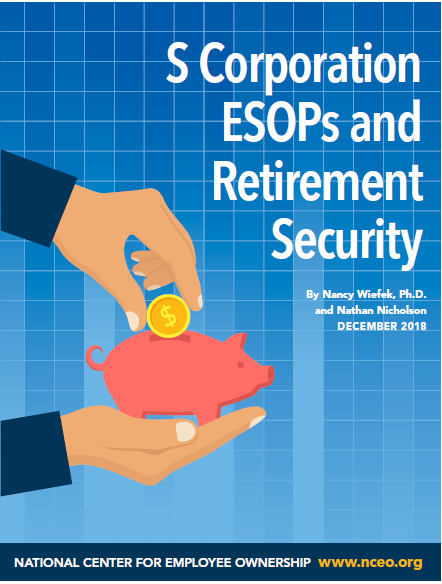Reports, meetings, webinars — employee ownership is a topic of growing interest
by Karen Kahn

National Center for Employee Ownership (NCEO) Issues Retirement Security Report:
“S Corporation ESOPs and Retirement Security,” a new NCEO research report, compares the retirement savings of employees in ESOP companies to average retirement savings among all U.S. workers. The survey of members of the Employee-Owned S Corporations of America (ESCA) captured data on 61,000 plan members in 39 ESOPs. Overall, the ESOP employees surveyed have more than twice the national average in savings in their retirement accounts, $170,326 as compared to $80,339. ESOP employees have more savings in every age group and across income categories (including those making less than $26,000 per year), but the difference is particularly stark among those approaching retirement age. Among those 55 to 64 years old, ESOP accounts average close to $324,000, and total retirement savings, including non-ESOP retirement balances, average around $426,000. The average retirement savings for all U.S. workers in this age group is just over $142,000. The NCEO report includes other employment measures, including turnover data showing that ESOP companies have much higher retention rates.
Council of Development Financing Agencies (CDFA) Webinar Discusses Employee Ownership: CDFA partnered with Fifty by Fifty to host a webinar(members only access) on employee ownership this fall. The educational event raised awareness of the risk to local economies posed by the wave of retiring baby boomer business owners and provided an opportunity to hear from economic development leaders about how employee ownership might be part of the solution. The webinar addressed three key issues: how economic development leaders are beginning to incorporate employee ownership into their work; the potential for a large-scale transition to employee ownership; and how development finance has helped the Evergreen Cooperatives of Cleveland access federal and local funding. Interest from CDFA members is a significant development for the employee ownership field, because development finance professionals wield substantial assets. They include municipal bonding authorities, port authorities, and other state, county, and municipal development finance agencies, as well as investment banks and commercial finance companies.
Interest from CDFA members is a significant development for the employee ownership field, because development finance professionals wield substantial assets.
Webinar speakers included: Melissa Hoover, executive director of the Democracy at Work Institute; Martin Staubus, executive director of the Beyster Institute, University of California San Diego; and David Ebersole, director of economic development for the City of Cleveland. Rena Nakashima, senior product manager at the Bank of New York Mellon, moderated the discussion.
Rutgers Hosts Meeting on Unions and Worker Ownership: Union leaders, employee ownership advocates, academics, and policymakers met December 5 for a day-long meeting hosted by the Institute for Employee Ownership and Profit Sharing and the Center for Innovation in Worker Organization at the Rutgers School of Management and Labor Relations. With labor facing enormous challenges in the current political environment, the meeting explored strategies to build worker power through creating, supporting, and partnering with worker-owned businesses. There was particular interest in how unions can catalyze taking employee ownership to scale. Also participants shared new models such as the Chicago CoRise Cooperative, a partnership between the ICA Group and SEIU to provide back office support to family day care providers; and Green Taxi, a Denver taxi driver cooperative developed and supported by Communications Workers of America (CWA 7777). The meeting also looked at some of the challenges these models present, drawing on the expertise of Mike Friedman, Center for Community-Based Enterprise; Keith Joseph, 1199SEIU; Bryce May, American Working Capital; Steve Sleigh, 1Worker1Vote; and Faith Wiggins, 1199SEIU Training and Employment Fund. Jon Cardinal from Senator Kirsten Gillibrand’s staff wrapped up with a discussion of the federal policymaking landscape.
Fifty by Fifty’s Marjorie Kelly Lecture Addresses Next Generation Enterprise Design: Marjorie Kelly, executive vice president at The Democracy Collaborative, spoke in November at the Vermont Law School, on ownership design for social mission. Kelly talked about how a democratic economy embraces broad-based ownership and aims to benefits the many, not just the few. Her talk introduced Fifty by Fifty’s research on the employee-owned B Corporation, a next generation enterprise design that is compatible with goals of social equity and environmental sustainability.
Karen Kahn is a writer, editor and communications consultant. She edits the Fifty by Fifty blog.
Fifty by Fifty, an initiative of @Democracy Collab, is working to transform the U.S. economy by growing employee ownership. Join our campaign, and we’ll send our monthly newsletter, filled with great company stories, right to your inbox.
